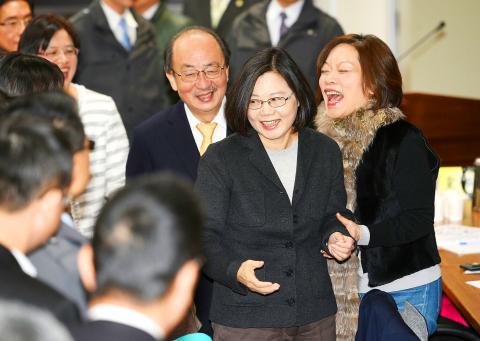President-elect Tsai Ing-wen (蔡英文) yesterday said she would respect the Democratic Progressive Party (DPP) caucus’ choice of legislative speaker for the incoming ninth legislature following the Jan. 16 elections.
Tsai made the remarks at a DPP caucus meeting in Taipei, which is to set new rules for the caucus and the procedures to appoint a speaker.
“The public is concerned with the Feb. 1 appointment of the new legislative speaker, and my approach is to honor the decision that the caucus will make as a body,” she said.

Photo: Chang Chia-ming, Taipei Times
The DPP made history by effecting the first party alternation in the legislature and must meet the expectations of the people by making the legislature a body that is “of the people,” focusing on professionalism and transparency, Tsai said.
“The elections are over and reform starts now,” she said, urging all parties to “abandon prejudices” and “unite in solidarity.”
Tsai said that the DPP would cooperate with other parties on administrative appointments and legislation to “build consensus” and “maximize energy for reform.”
Regarding the appointment of Premier Simon Chang (張善政) on Monday by President Ma Ying-jeou (馬英九), Tsai said that the constitutional authority of the Presidential Office would be respected, and the DPP would help ensure political stability and the continued functioning of the government.
“Whether it is called an interim or caretaker Cabinet, the administration must perform its assigned function, just as legislators are to carefully supervise and respect the government, especially giving due respect to civil servants who shoulder the burden of maintaining the continuity in governance,” she said.
Tsai added that she sensed a marked change in the mood of the DPP caucus from its previous meeting before the elections, in which every legislator reported that their seat was at risk, as well as her first address in 2008 to the caucus as DPP chairperson, when the party did not have enough legislators to fill the front row.
Unnamed sources in the DPP said that by tradition, leadership positions within the caucus go to vote only after negotiations by contenders had concluded, and it is likely that the positions for legislative speaker and deputy speaker would be filled in the same way.
Three legislators-elect are believed to be running for speaker: Ker Chien-ming (柯建銘), Chen Ming-wen (陳明文) and Su Jia-chyuan (蘇嘉全).
Last week, Tsai spoke against aggressive campaigning for the speaker’s position, which she said might be detrimental to the party’s image, and Ker, Chen and Su’s respective camps toned down their rhetoric.
Reports on Monday said that Tsai’s caucus speech, which required last-minute changes to her schedule, was meant to foil a straw poll covertly planned by an unnamed legislative speaker hopeful, a report DPP Legislator Tsai Chih-chang (蔡其昌) denied.
In other news, in an interview on Monday with the radio channel Super FM98.5, Ker promised to open legislative sessions to citizen reporters, saying that a lack of transparency had been caused by the “too conservative” approach of KMT Legislative Speaker Wang Jin-pyng (王金平), and that he considers the most important task of the next legislative speaker is “repairing the Legislative Yuan’s reputation.”

‘ABUSE OF POWER’: Lee Chun-yi allegedly used a Control Yuan vehicle to transport his dog to a pet grooming salon and take his wife to restaurants, media reports said Control Yuan Secretary-General Lee Chun-yi (李俊俋) resigned on Sunday night, admitting that he had misused a government vehicle, as reported by the media. Control Yuan Vice President Lee Hung-chun (李鴻鈞) yesterday apologized to the public over the issue. The watchdog body would follow up on similar accusations made by the Chinese Nationalist Party (KMT) and would investigate the alleged misuse of government vehicles by three other Control Yuan members: Su Li-chiung (蘇麗瓊), Lin Yu-jung (林郁容) and Wang Jung-chang (王榮璋), Lee Hung-chun said. Lee Chun-yi in a statement apologized for using a Control Yuan vehicle to transport his dog to a

Taiwan yesterday denied Chinese allegations that its military was behind a cyberattack on a technology company in Guangzhou, after city authorities issued warrants for 20 suspects. The Guangzhou Municipal Public Security Bureau earlier yesterday issued warrants for 20 people it identified as members of the Information, Communications and Electronic Force Command (ICEFCOM). The bureau alleged they were behind a May 20 cyberattack targeting the backend system of a self-service facility at the company. “ICEFCOM, under Taiwan’s ruling Democratic Progressive Party, directed the illegal attack,” the warrant says. The bureau placed a bounty of 10,000 yuan (US$1,392) on each of the 20 people named in

The High Court yesterday found a New Taipei City woman guilty of charges related to helping Beijing secure surrender agreements from military service members. Lee Huei-hsin (李慧馨) was sentenced to six years and eight months in prison for breaching the National Security Act (國家安全法), making illegal compacts with government employees and bribery, the court said. The verdict is final. Lee, the manager of a temple in the city’s Lujhou District (蘆洲), was accused of arranging for eight service members to make surrender pledges to the Chinese People’s Liberation Army in exchange for money, the court said. The pledges, which required them to provide identification

INDO-PACIFIC REGION: Royal Navy ships exercise the right of freedom of navigation, including in the Taiwan Strait and South China Sea, the UK’s Tony Radakin told a summit Freedom of navigation in the Indo-Pacific region is as important as it is in the English Channel, British Chief of the Defence Staff Admiral Tony Radakin said at a summit in Singapore on Saturday. The remark came as the British Royal Navy’s flagship aircraft carrier, the HMS Prince of Wales, is on an eight-month deployment to the Indo-Pacific region as head of an international carrier strike group. “Upholding the UN Convention on the Law of the Sea, and with it, the principles of the freedom of navigation, in this part of the world matters to us just as it matters in the